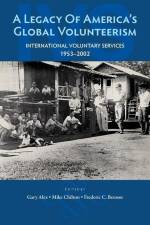av Mike Chilton, Frederic C. Benson & Gary Alex
279
A Legacy of America's Global Volunteerism: International Voluntary Services 1953-2002 explores the philosophical and organizational growth of international volunteerism. The book describes the International Voluntary Services, Inc. (IVS) innovative use of volunteers in relief and development projects and the challenges faced in both its public-private partnerships and field operations. Analysis of impacts and lessons from IVS's fifty-year lifespan may provide guidance for future international voluntary service institutions and programs. Volunteers' personal stories highlight issues inherent in international development and volunteerism. Section I, History of International Voluntary Services, Inc., covers events from the start of IVS in 1953 to its closure in 2002. Described are programs initiated by the U.S. Government and private organizations that engaged American volunteers in development and relief activities worldwide. Initially focused on sensitive areas of the Middle East and Indochina, IVS programs expanded and internationalized throughout the Global South. Section II, Volunteer Experiences And Impacts, describes the wide-ranging experiences of individual volunteers and the challenges of evaluating the impact of volunteer programs. Section III, International Voluntary Services Partners, identifies partnership programs ranging from "Peace Church" volunteer programs that inspired IVS, to recent U.S. Government volunteer initiatives, and the formation of the U. S. Peace Corps. Section IV, Implications and Questions for Future International Volunteerism, analyzes lessons learned from the IVS experience and their implications for future international volunteer activities. The author of the book's first chapter, entitled IVS Origins and Early Years, is a former Peace Corps volunteer; the following chapters were written by IVS alumni and professionals in the field of volunteerism who frame the IVS experience in the context of a broader international development picture. Individual volunteer stories throughout the book describe the challenges they faced and their wide-ranging successes and failures. The book highlights the dramatic changes throughout the world during the second half of the Twentieth Century and how these changes impacted international volunteerism. It concludes that international volunteerism remains relevant today, as reflected in the Peace Corps, which has had 241,000 volunteers serving in 143 countries since 1961.

